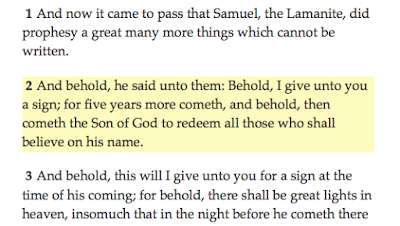The first miracle of Joseph Smith's new church was an exorcism. Now not all latter-day saints know what to make of exorcisms, but it's definitely a recognized practice in the New Testament, The Book of Mormon and elsewhere.
If you've heard the story of how Joseph cast a devil out of Newel Knight, there's a good chance it sounded pretty straight forward. The LDS Church, as it just so happens, likes to present its history in a clean, easy to swallow format fit for children - even if its for adults.
I, however, suggest we look at a more complete version of this miraculous exorcism as described by Dan Vogel, who takes into account a number of witness testimonies (emphasis mine).
"... when [Joseph] Smith asked him to pray, Newel begged to be excused. Like his father, he may have considered prayer to be a private matter and found his first attempt at public prayer embarrassing and difficult. Despite Smith's encouragement, Knight insisted on delaying his vocal prayer until morning when he could go into the woods.
"The next day, Knight attempted several times to pray vocally but experienced great difficulty. He began to feel a flood of emotion: anxiety, guilt, confusion, and finally panic. By the time he returned to his house, 'his appearance was such as to alarm his wife very much.' A desperate Newel anxiously asked his wife to bring Smith to him. 'I went and found him suffering very much in his mind,' Smith recalled, 'and his body acted upon in a most strange manner. His visage and limbs [were] distorted and twisted into every possible shape and appearances, and finally he was caught up off the floor of the apartment and tossed about most fearfully.' ...
"... Knight was unable to speak during his convulsions, for Smith reports that when he took hold of Knight's hand, 'almost immediately he was able to speak.'
"... Newel earnestly requested Joseph to cast the devil out of him. In front of eight or nine people who had gathered to witness the scene, Joseph said, 'If you know that I can, it shall be done.' Then Joseph rebuked the devil, commanding it 'in the name of Jesus Christ' to depart from Newell, upon which the latter 'saw the Devil leave him and vanish from his sight.'
Newel recalls levitating at this point:
"I felt myself attracted upward and remained for some time enwrapped in contemplation insomuch that I know not what was going on in the room. By and by I felt some weight pressing upon my shoulder and the side of my head; which served to recall me to a sense of my situation, and I found that the Spirit of the Lord had actually caught me up off the floor, and that my shoulder and head were pressing against the beams."
"... When Smith is brought to trial in South Bainbridge and Colesville in July 1830, Knight testifies that Smith had cast the devil out of him, but is evasive when asked to describe what the devil looked like. ... Apparently, he was less evasive in his home town, for Joel K. Noble, who presided over the trial in Colesville, remembered that Knight 'swore in open court [that] Jo. Smith cast a devil out of him ... and said how [the] devil looked. Said devil was a body of light..."
"So I just cast it the fuck out right then and there! Easy!"
"... others remembered that Knight gave additional details. In the earliest account of the incident, [Martin] Harris said to Abner Cole in June 1830 that the devil, whom Smith had cast out of Newel, was of 'an uncommon size.' According to a later source, Joseph Knight Sr. and Josiah Stowell testified that they had seen the devil as well. Once testified that he saw 'a devil as large as a woodchuck leave the man and run across the floor,' while the other said he saw the devil leave the possessed and 'run off like a yellow dog.' neither witness said that Knight specifically described the devil's appearance, only that he had given an approximation of its size. This was confirmed by William R. Hine, a resident of Colesville, who said that Knight's testimony before Justice Noble was that 'Smith had cast three devils out of him. ... The first was as large as a woodchuck, the second was large as a squirrel, the third about the size of a rat.' When the judge asked what became of them, 'Knight said that they went out at the chimney.'" Dan Vogel, Joseph Smith: The Making of a Prophet, pp. 496-98.
Demon woodchucks and their pals? I fucking hate them. Floating on the ceiling in ecstasy? Fucking love it. Thoughts on whether this miracle is legit? I think I'll go eat some ice cream.















